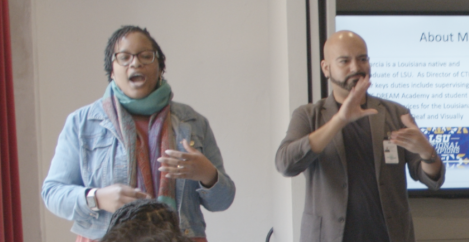Home » Resources » Access & Accommodations » Coordinating Services
Coordinating Services
Coordinating effective accommodations and services for deaf students requires careful planning, collaboration, and sometimes innovation. It is important to establish a strong and consistent framework for planning, implementing, and assessing services—all while centering the deaf student in the process. Streamlined services can yield many benefits for deaf students, such as enhanced accessibility, increased participation, and higher completion rates.
Managing accessibility in postsecondary settings, especially in dynamic environments, requires thoughtful planning and time investment. Developing robust systems within the disability services office and throughout the campus is vital. Proactive planning and consideration of deaf students’ needs are essential.
Explore This Topic
Making Online Learning Accessible for Deaf Students
Accommodations that deaf students had for a face-to-face classroom may not be effective in an online course. Even accommodations used for one online course may need to be adjusted for another course. The communication preferences of deaf students often change across different settings and contexts.
Deaf students also encompass a range of identities, experiences, and backgrounds. It is critical that disability service professionals consider these diverse backgrounds when coordinating access for online courses—for example, approximately 50% of deaf students have additional disabilities. It is crucial to have an ongoing dialogue with students about auxiliary aids and services that support learning and communication for their online courses.
Planning for Accommodations and Services
Traditionally, planning for accommodations begins when the deaf student registers. However, with a growing number of deaf students enrolling in various postsecondary education and training programs, proactive planning for access is essential.
Proactive planning includes:
- Exploring accommodation and accessibility options, including prep work regarding local service providers (costs, availability, licensing laws)
- Establishing comprehensive policies and practices that center the deaf student and their experiences
- Building relationships across campus to create a shared sense of responsibility for accessibility that extends throughout the institution
Key Considerations When Planning for Accommodations

When making accommodation decisions, disability service professionals need to be familiar with the concept of “effective communication” and to take into consideration the students preferred method of communicating as well as the academic or social setting. Start with the interactive process, a conversation to establish a baseline of what has worked for the student in the past. Together determine which accommodations are most appropriate and have processes in place to check in frequently and gather feedback. Include the deaf student throughout the decision-making process, with enough follow-up to ensure that the chosen accommodations continue to meet the student’s needs. If certain accommodations are not working out, adjustments need to be made to ensure effective communication.
Accommodation Decisions are Case-by-Case
Accommodations, choices, and preferences for accessibility may vary depending on setting, situation, and context. Flexibility and understanding to accommodate individual requests is necessary.
Accommodation Experiences May Be New
Accommodations that a student used in K-12 are often different from the accommodations required by the dynamics and demands of postsecondary settings. Encourage open dialogue by asking questions about accommodation preferences.
Subjective Experience Matters
Deaf people’s lived experiences vary widely, and there is no one-size-fits-all approach for effective accommodations. Legal guidance regarding effective communication will defer to the deaf person’s subjective experience.
Audiograms are Merely Medical Records
Audiograms offer a limited view of a person’s abilities; they do not provide information about how the deaf person operates or communicates, and navigates barriers daily.
Arranging Accommodations & Services
Arranging accommodations and services can be challenging due to numerous factors and steps that must be invested into quality, consistent, and effective services. However, it is the institution’s responsibility to locate, maintain, and secure accommodations and services, including qualified service providers. To preserve the quality and equity of opportunities for deaf students there are a number of considerations to keep in mind and potential challenges to anticipate along the way.
Disability service providers should conduct a needs assessment that considers current circumstances and anticipated needs to aid in planning. Anticipated needs should extend beyond the classroom and include access to all aspects of campus life. Arranging and planning for accommodations takes time, however, the following tips can help establish a solid framework for the best possible experience for deaf students:
Providing opportunities for orientation to accommodations and services at the institution can help familiarize students with policies and practices. Establishing a shared understanding of roles and responsibilities in the accommodations process is an important factor in effective services. Orientations may include discussions around logistical details, request protocols, expectations, and responsibilities of everyone involved in the accommodations process. Dedicated orientations or meetings can also build rapport and cultivate a positive relationship with the student through transparent communication and committing space for questions and open communication.
It is important to establish guidelines, policies, and standard practices for service providers to ensure clarity and understanding of expectations and responsibilities. Communication and guidelines should be transparent regarding logistics, such as hiring, scheduling, compensation/payment, perks, and dismissal where applicable, as well as key practices like prep time, on-call roles, schedule additions, substitutions, feedback, and communicating with disability services professionals. Whether service providers are hired through an agency or directly by the institution, clear communication is necessary.
For more information about working with providers visit: Hiring Qualified Speech-to-Text Providers, Hiring Qualified Interpreters, and Developing Contracts and Requesting Bids: Interpreters and Speech-to-Text Providers.
Seek opportunities to introduce and inform staff, faculty, and other departments about accommodations and services. Increased awareness is one way to begin to reduce barriers that can result in negative or traumatic experiences for deaf students. Establishing opportunities to provide information on how devices work and how users benefit from them or how to work with service providers can be helpful for everyone. Departments on campus should know how to interact with a deaf students and providers in their offices or at events, know to advertise events with a clear way to request accommodations, and know who to contact when they receive a request. Another opportunity to communicate with instructors is prior to the start of the semester to inform them that a service provider has been assigned to their class with an accommodation letter. Instructors should be aware of services or equipment, what they are expected to do, and how to navigate challenges.
Efficient provisions of services include systems of sustainable policies and protocols based on best practices. These guidelines promote informed decision making, accountability, and transparency in communication. Accommodations are effectively managed when there are:
- Request processes that define or describe how accommodation requests will be submitted, including information for fulfilling specific provider requests
- Notice requirements that specify the amount of advance notice is required for requests, changes, and cancellations.
- How requests with minimal notice will be handled.
- Communication protocol that shares expected responses, confirmations, changes or updates that need to be made.
- Feedback mechanisms that outline channels for receiving and acting upon feedback.
- Grievance protocols that describe how and to whom to submit complaints, how those complaints will be addressed, and what to expect during the process.
The ADA does not require that an interpreter be certified, but interpreters are required to be qualified. Under the ADA, a qualified interpreter is defined as, “one who is able to interpret effectively, accurately and impartially, both receptively and expressively, using any necessary specialized vocabulary.” When securing a professional provider you want to take into consideration the type of training they have had and the licenses/credentials they hold, as well as their experience with the topic.
Some providers may be hired directly, as part-time or full time employees, while others may require contracts, competitive bid processes, or RFP for services. Institutions should consult with their administration, human resources or business office to determine the protocol for securing providers. In circumstances when an agency is contracted for arranging providers, it is still the institution’s responsibility to ensure that the providers are qualified and appropriate for the work opportunity. Regardless of how providers are hired, it is important to build working relationships with the providers to ensure the best possible services for deaf students.
To learn more about sign language interpreting or speech-to-text services, we recommend you take the Introduction to Interpreting Services and speech-to-text modules.
IN THE NEWS
Funding Systems and Strategies for Accommodation Expenses
For many students, attending college is a time of personal growth and enrichment as they explore potential career paths, build connections, and participate in life-changing opportunities through university-sponsored programs.
Evaluating Services
Once accommodations have been identified and implemented, they should be monitored and evaluated regularly. Creating opportunities to collect student feedback is an important part of coordinating services. Establishing a systematic process for collecting data from students is essential to ensuring effective and high quality experiences for deaf students. Additionally, being able to provide student feedback to administrators adds weight when negotiating for greater access, such as hiring additional DSS staff or proactively providing accommodations for campus events.
Collecting feedback is an ongoing process. From initial meetings to regular check-ins, it is vital to assess what’s effective and where adjustments may be needed in accommodation provision. It’s important to remember that a lack of feedback from students doesn’t necessarily mean everything is going smoothly. Proactively seeking their input is advisable, as some students may not habitually provide feedback, and deaf students might feel hesitant to express concerns after past experiences. Establishing a straightforward feedback mechanism with multiple submission channels is key to addressing student concerns transparently.
Have paper copies of the feedback form for students to fill out in the disability services office.
Post feedback forms on the disability services office website that can be accessed easily.
Share a link to the feedback form in a tagline at the bottom of all email responses.
Create quick and simple check-box style feedback questions with the option to add a more detailed response. Avoid dense, time-consuming surveys.
Provide and deliver feedback mechanisms using different modes of communication (such as text-based or video-based surveys) and platforms (such as email or text messaging).
Provide a link to an online scheduling platform that allows students to set up face-to-face or video conferencing meetings to discuss specific challenges or issues with accommodations.
Applying a System-Wide Approach
Together NDC and institutions can improve outcomes by reducing barriers and ensuring meaningful access to all programs and services available at the institution. To ensure that your campus is prepared to support accommodation requests, take a system-wide approach that includes key players outside your department — faculty, information technology staff, and campus staff, for example. The underlying goal is for deaf students to access the college experience which requires a commitment to improving the current status quo and establishing sustainable policies and practice centered in the experiences of deaf people.
Sustainable Recruitment and Retention Strategies for Sign Language Interpreters & Captionists
Ensuring accessible experiences in education and training settings for deaf people includes having a qualified pool of providers. Whether you are proactively planning or responding to an unexpected need, you can employ strategies that will find the providers you need and establish long term relationships with them.
Coordinating Services for Deaf Students Online Learning Module
Coordinating effective accommodations and services for a range of deaf individuals takes time and proactive planning. While the numbers of deaf students may vary by semester, it is always a good idea to have a solid structure for planning, implementing, and evaluating services provided. This module provides an overview of key components for coordinating accommodations and services effectively for deaf students in education and training settings.














